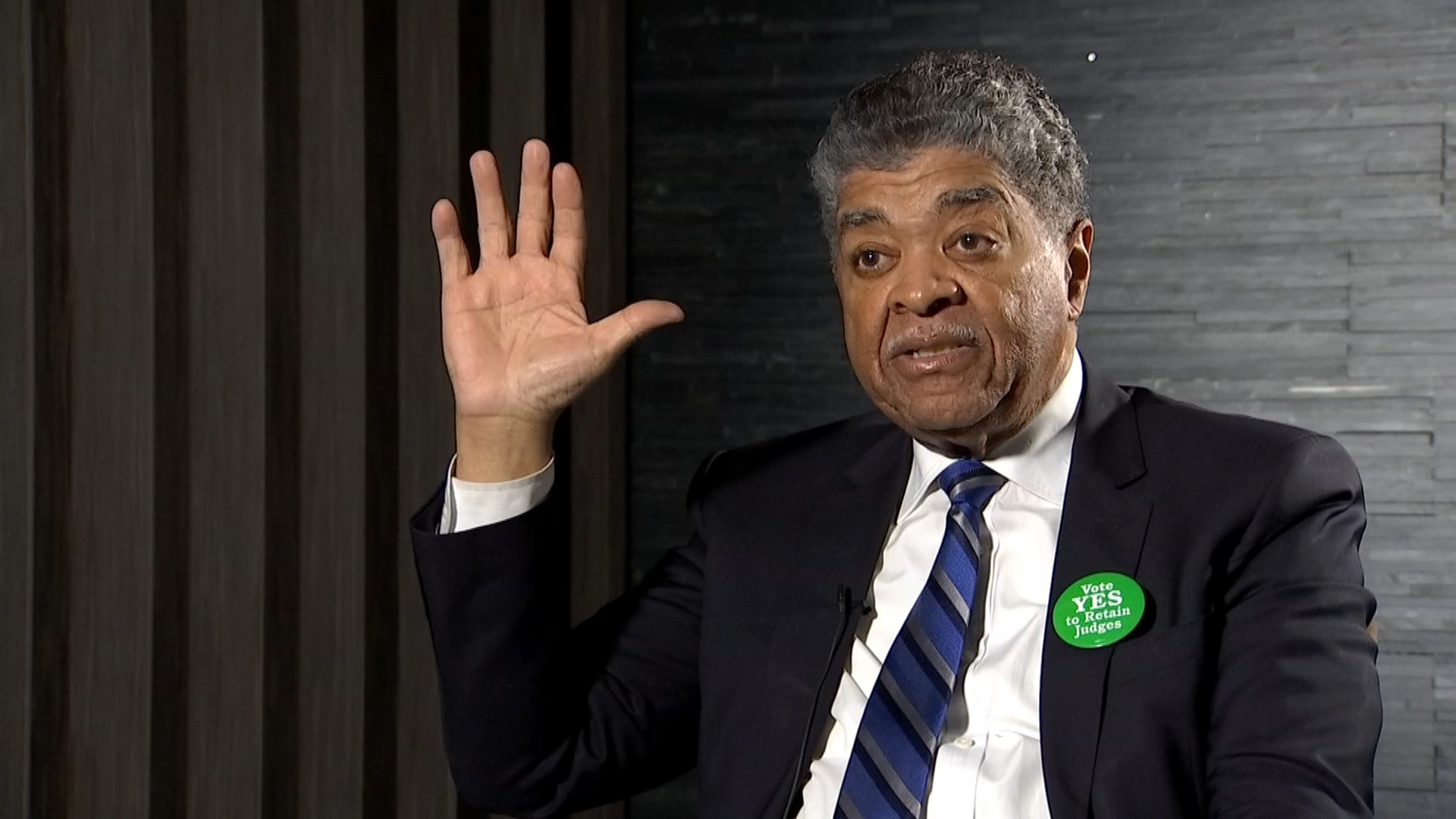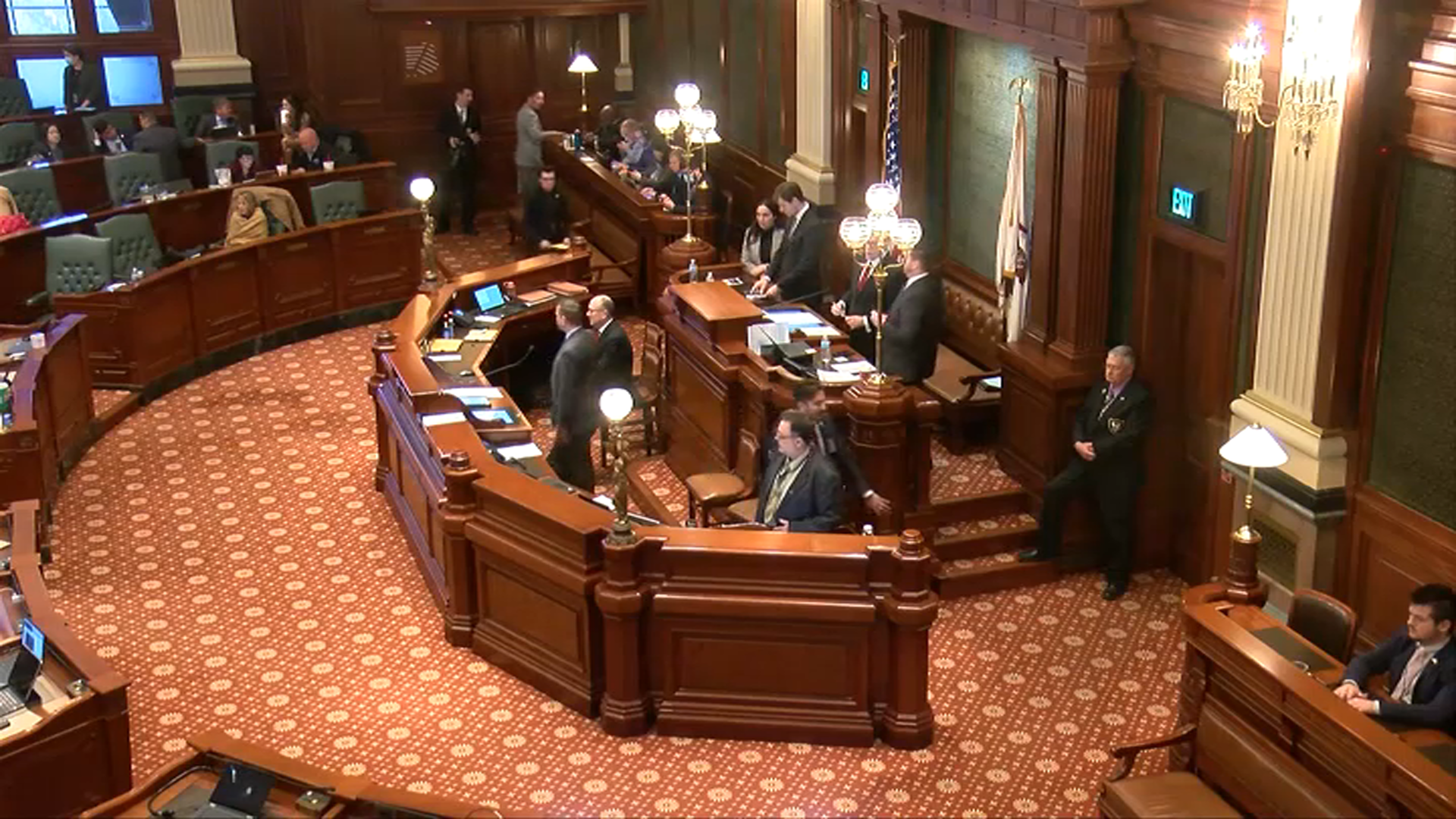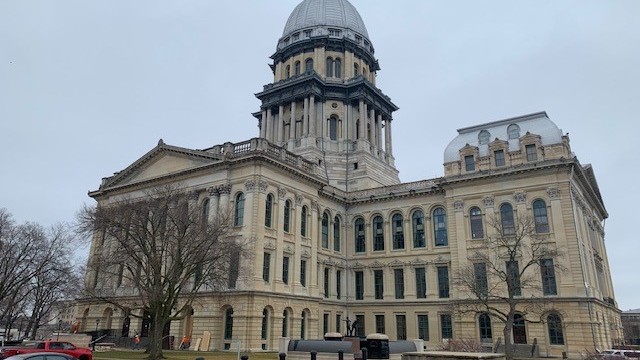Just days before a sweeping criminal justice reform bill known as the SAFE-T Act was set to go into effect in Illinois, a Kankakee judge ruled that the bill's controversial elimination of cash bail was unconstitutional.
According to the ruling issued Wednesday by 21st Circuit Court Judge Thomas Cunnington, the pre-trial fairness portion of the bill -- otherwise known as the elimination of cash bail -- is in violation of the state constitution. Cunnington ruled that since cash bail is specifically mentioned in the state constitution, it would be needed to put before voters and would therefore require an amendment to remove.
The other provisions of the SAFE-T Act -- including a requirement that police wear body cameras, a ban on all police chokeholds -- were upheld, a press release from Kankakee County State's Attorney Jim Roe says.
Although Illinois Gov. J.B. Pritzker earlier this month signed the recently amended bill into law, a lawsuit brought forth by more than three dozen prosecutors and sheriffs across the state challenged the act, resulting in plaintiffs in 65 counties naming Pritzker, as well as Attorney General Kwame Raoul, Senate President Donald Harmon and Speaker of the House Chris Welch as defendants.
The ruling means that the pre-trial fairness portion of the bill will not go into effect on Jan. 1 in the Illinois counties that were part of the class-action suit, Rowe said. However, a press release from Raoul's office says that the measure will still go into effect on Jan. 1 as intended in counties that were not party to the suit and "it is important to note that it is not binding in any other case, including those involving criminal defendants in any of the state’s 102 counties."
Raoul also said he intends to appeal the ruling to the Supreme Court.
Here's a breakdown of how elected officials are reacting, an overview of the SAFE-T act and more.
What Supporters, Opponents and Elected Officials Are Saying
Supporters of the bill, which was pushed forth by Illinois Democrats, say the elimination of cash bail is a step towards fairness in an unbalanced system.
“Today’s ruling is a setback for the principles we fought to protect through the passage of the SAFE-T Act," Pritzker said in a statement after the ruling was announced. "The General Assembly and advocates worked to replace an antiquated criminal justice system with a system rooted in equity and fairness. We cannot and should not defend a system that fails to keep people safe by allowing those who are a threat to their community the ability to simply buy their way out of jail. I thank the Attorney General for his work on this case and look forward to the Illinois Supreme Court taking up the appeal as soon as possible.”
Feeling out of the loop? We'll catch you up on the Chicago news you need to know. Sign up for the weekly> Chicago Catch-Up newsletter.
A statement from the Illinois Network for Pretrial Justice called the "lawsuit "frivolous" and the ruling "disappointing," saying that "delaying the implementation of the Pretrial Fairness Act harms marginalized communities and survivors of violence. The current money bond system prioritizes access to wealth over public safety. Every year, thousands of people lose their jobs, housing, and custody of their children—not because a judge believes they’re dangerous, but only because they don’t have the money to buy their freedom. By protecting the status quo, the State’s Attorneys and sheriffs behind this lawsuit are making our communities less safe."
Opponents, however are calling the ruling a "victory," and say the elimination of cash bail neglects victims of crime.
“Today’s ruling is a victory for the often neglected victims of crime and the men and women of law enforcement who wear the badge every day," said House GOP Leader Jim Durkin. "Legislation of this magnitude must not only be judged on substance, but also on process. In that regard, the Illinois Democrats failed Illinoisans. In order to fix this one-sided, anti-law enforcement, and anti-victim act, it is imperative to have a transparent and substantive negotiation with all interested parties, not just a few stakeholders and political insiders. The people of the State of Illinois deserve nothing less.”
"I was elated," said Darren Bailey, Republican state senator from Xenia who lost to Pritzker in November's closely-watched governor's election. "I spent two years arguing the fact that this was indeed unconstitutional, this is a victory. For law enforcement. This is a victory for the State's Attorneys that that put their necks stuck their necks out and put them on the line to say something's not right here. This is a victory in our judicial system. And most importantly, this is a victory for the people of the state of Illinois, that that a court judge would look at this and say, and now this this doesn't pass the test it is and indeed unconstitutional."
What is the SAFE-T Act?
Emerging after the Minneapolis police beating death of George Floyd in May 2020, the SAFE-T Act sets rigorous new training standards for law enforcement, spells out rules for police use of force in immobilizing troublesome suspects, requires body cameras on all police by 2025 and more.
Authored by the Illinois Legislative Black Caucus, the act was approved by the Illinois General Assembly last year, bringing "significant changes" to things like police training policies, police accountability, transparency in law enforcement and the rights of detainees and prisoners, according to Sen. Elgie R. Sims, Jr., who sponsored the bill.
Among the changes it is set to bring are the elimination of monetary bail, a requirement that all police officers wear body cameras by 2025, a ban on all police chokeholds, new guidelines for "decertification" of police officers, and an end to suspended licenses for failure to pay, among several other things. It also bans police departments from purchasing military equipment like .50 caliber rifles and tanks, increases protection for whistleblowers, and adds to rights for detainees to make phone calls and access their personal contacts before police questioning.
Detainees, prisoners and all those who interact with police officers would have the expectation of prompt medical care while in custody, with special accommodations made for pregnant women. Charges of resisting arrest must cite a justification for the original arrest that was allegedly resisted against under the measure, as well.
For a complete list of what was included in the original SAFE-T Act click here.
How Would Bail Work Under the SAFE-T Act?
Under the original provisions of the bill, as passed by the General Assembly, the state would allow judges to determine whether individuals accused of a specific set of felonies and violent misdemeanors pose a risk to another individual, or to the community at large. Judges will also be asked to determine whether the defendant poses a flight risk if released.
If the judge makes any of those determinations, then the defendant may be held in jail prior to trial.
The list of so-called “forcible felonies” that could invite judicial discretion on pretrial detention includes first and second-degree murder, predatory criminal sexual assault, robbery, burglary, residential burglary, aggravated arson, arson, kidnapping, aggravated battery resulting in great bodily harm, or any other felony that involves the use or threat of physical force or violence against an individual. Several other crimes were added to this list under the recent amendment. (See below)
Detention hearings would not be not mandatory for crimes that include probation as a possible punishment, but judges can still make the determination to keep those defendants incarcerated pending trial if they determine they are a risk to the public.
Those charged with stalking, aggravated stalking, domestic battery and aggravated domestic battery would also potentially be subject to pretrial detention.
What Amendments Were Added?
The amendment focuses largely on clarifying language on several fronts, including whether defendants detained prior to Jan. 1 will be released once the legislation goes into effect, and making clear which crimes would qualify for pretrial detention.
Crimes Added to Detention Net
The list of so-called “forcible felonies” that could invite judicial discretion on pretrial detention originally included first and second-degree murder, predatory criminal sexual assault, robbery, burglary, residential burglary, aggravated arson, arson, kidnapping, aggravated battery resulting in great bodily harm, or any other felony that involves the use or threat of physical force or violence against an individual.
But the latest proposal adds non-probationable felonies, forcible felonies, hate crimes, attempts of crimes that are otherwise detainable, and others to the so-called detention net — crimes that qualify a suspect for detention. Additions include offenses that require jail or prison time, and not probation; all forcible felonies; hate crimes, animal torture and DUI causing great bodily harm. Judges may also choose to release such suspects.
“We still have a detention net that is very clear, judges have discretion within that detention net,” Illinois State Sen. Robert Peters, who filed the amended bill, said. “But again, the intent and the core parts of this legislation remain intact.”
New Language Surrounding Hearings for Those Already Detained as of Jan. 1
According to a spokesperson for Illinois Senate President Don Harmon's office, the new language would clarify that "those currently detained can request to have the new system applied to their situation."
In order to make the process "manageable for courts," legislators proposed a tiered system for granting hearings on such requests. The hearings would then determine whether a current detainee should be released. The tiers would include:
- Lowest level offenses (example: petty shoplifting) hearings must be within 7 days of request.
- Those detained but considered flight risks would get hearings within 60 days.
- Those considered to be potential threats to safety get hearings within 90 days.
Trespassing Changes
Proponents of the bill say this was always allowed under the SAFE-T, but the amendment seeks to clarify some language.
For trespassing violations, officers would be required to issue a citation to a suspect first, unless the officer reasonably believes that the suspect poses a threat, or if they have an obvious mental or medical health issue. If an officer issues a citation and the trespassing continues, then an arrest can be made.
Under the latest proposal, an officer can arrest someone for trespassing if:
- The person poses a threat to the community or any person;
- Arrest is necessary because criminal activity persists after issuance of the citation; or
- The accused has an obvious medical or mental health issue that poses a risk to their safety.
If the above conditions are not present, a citation would be issued.
Definition of 'Dangerous' and Flight Concerns
The proposed changes also expand definitions for "willful flight," and expand judicial discretion in determining whether a defendant poses a danger to the public or a specific individual.
According to Harmon's office, the amendment "makes consistent throughout the entire act what a prosecutor must show to detain an individual on grounds the individual is a threat."
The so-called “dangerousness standard” would be met if "the person poses a real and present threat to any person or persons or the community, based on the specific, explainable facts of the case."
What Happens if Someone Misses a Court Date
Also included in the new proposal is a provision that allows judges to issue arrest warrants or summons when someone misses a court date.
A summons is an official notice to appear in court, while an arrest warrant tells police to arrest and detain, officials stated.
The amendment also clarifies what is considered “willful flight” under the bill, adding that "intent is to detain those who are actively evading prosecution, not someone who failed to appear in court because, for example, they missed their bus," Harmon's office said.




